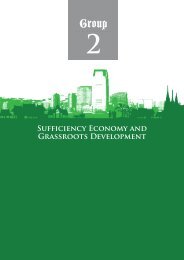Conflict, Legitimacy and Government Reform: Equitable Allocation of ...
Conflict, Legitimacy and Government Reform: Equitable Allocation of ...
Conflict, Legitimacy and Government Reform: Equitable Allocation of ...
Create successful ePaper yourself
Turn your PDF publications into a flip-book with our unique Google optimized e-Paper software.
186 KPI Congress XI<br />
community organization leader. When people in villages or<br />
communities face any problem <strong>and</strong> a local administrative<br />
organization is responsible for solving that problem, they will<br />
file grievances directly to a local administrator or sub-district<br />
head or village head rather than a local council member. In<br />
some cases, local administrators resort to “village community”<br />
meeting in the course <strong>of</strong> the development <strong>of</strong> village plan/<br />
community plan or during the occasion that they can directly<br />
listen to public opinions about implementation <strong>of</strong> public<br />
policies.<br />
5. The stipulation <strong>of</strong> a similar structure for all forms <strong>of</strong> local<br />
administrative organization, that is, local administrators <strong>and</strong> council<br />
members are chosen by a direct election. Based on political,<br />
administrative <strong>and</strong> social fabrics as well as political culture where local<br />
administrative organization is not the only local government organization<br />
that can exercise administrative power in the provision <strong>of</strong> public services<br />
within a local administrative organization’s territory. However, other<br />
organizations also play their roles in the exercise <strong>of</strong> power, that is, central<br />
authorities, regional authorities, local administrators (sub-district head<br />
<strong>and</strong> village head), civil society organizations (committee organization<br />
council <strong>and</strong> various activity groups). Moreover, decision-making format<br />
<strong>of</strong> public policies <strong>of</strong> most local administrative organizations is not a<br />
majority rule in a local council (representative democracy) <strong>and</strong> the<br />
structure <strong>of</strong> directly elected local council alone is not representative <strong>of</strong><br />
diverse groups in a locality. Meanwhile, the administrative branch’s<br />
determination <strong>of</strong> numerous matters requires deliberative democracy<br />
approach to deal with various groups in order to prevent conflicts with<br />
political groups, governance groups <strong>and</strong> social groups within a local<br />
administrative organization’s territory.<br />
Policy recommendations<br />
1. Amend Section 284 <strong>of</strong> the Constitution <strong>of</strong> the Kingdom <strong>of</strong><br />
Thail<strong>and</strong> B.E. 2550 (2007) in respect to the issues concerning the<br />
selection process <strong>of</strong> local council members. The recommendation is there<br />
should be various forms <strong>of</strong> local council, that is, (1) local council














